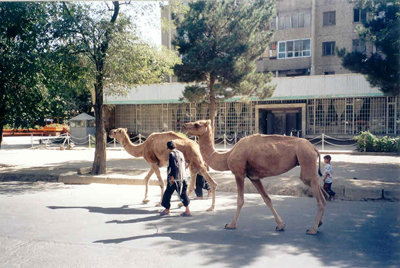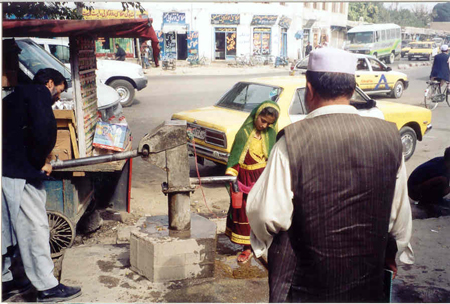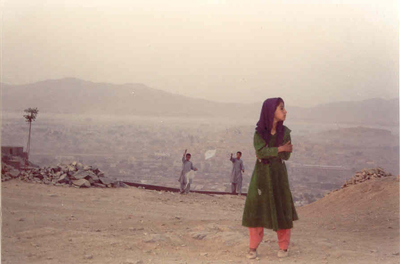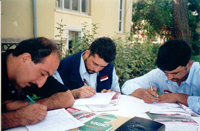October 14, 2003
Kabul Letter Number One
August 5, 2003
Dear Thomas,
I have now been in Kabul for about 48 hours, and I thought you might be interested to read some of my impressions so far. It is slowly dawning on me that I really am here. The contrast with Dubai, the Mecca of shopping (where I stopped over on Saturday night and was given a three-room suite at a 5-star hotel, run by Indonesians and Japanese) is as extreme as you can imagine—I certainly prefer it here. In fact I wonder if ‘development’ means becoming like Dubai. Our flight to Kabul from Dubai on Afghan Airlines took about two hours, over the Persian Gulf and Iran. Sitting next to me was an Afghan man who now lives in Canada—this was his first trip back for over ten years. As we came in to land you could see the dry desert landscape stretching in all directions, with the low, mud-built square houses which seem to be typical of Afghanistan, a little like the adobe houses of the Indians of New Mexico. As we taxied along the runway to the terminal buildings, you could see the wreckage of military planes, rusting or burnt-out, on both sides. This immediately makes you feel that you are somewhere very different.

As soon as I got to the terminal building, my friend and employer Tim was there to meet me, along with our driver, Razoul—he, like most of the better educated English-speaking people now getting jobs with the many charity agencies in Kabul, had been living in Pakistan until the fall of the Taliban. The scene at the airport was fairly chaotic, with lots of Afghans in their exotic clothes—I really like the way they dress, especially the varieties of headgear, like the great turbans, and their long flowing shirts. I certainly intend to buy something of the sort for myself, but not just yet. The most curious thing is that a lot of them dye their long beards bright red, which looks quite comic, but I am told it is because black beards are hotter. Most women still seem to be wearing burkas, completely covering their head and body, but some just wear a headscarf and a long outer garment. Eventually we got out into the car, and Razoul drove us into the area of town where I am living. This was my first view of the city. The first thing to say is that it really is much more relaxed than expected; there are not many soldiers to be seen on the streets, and the few American soldiers I’ve noticed look surprisingly inconspicuous. Most men travel by bicycle, with their long robes flowing beside them, though there are a fair number of cars around. Kabul itself is hot but not too hot, and dry, which makes the heat a lot more tolerable. However it is very dusty, so I am constantly thirsty. The least pleasant thing is the smelliness, a sort of constant dull smell of rubbish and sewage; the drainage system is not very up to date. Yesterday I found I was have trouble breathing, and I thought it was because of the smell or the dust, but I have since learnt it is because of the altitude: Kabul is about 7,000 feet above see level, and it takes time to adjust to that. The buildings here are all very low-lying, usually two stories at most. Running through the center of the city is a chain of low mountains. On the other side of the city, the destruction from the fighting is much more apparent, for it bore the brunt of the shelling—rows and rows of ruins and collapsed buildings. The part I live in is more intact, and there are a lot of NGOs and aid agencies based here, usually surrounded by walls with a chaka wallah (gate man) sitting outside. There are lots of small workshops dotted around, usually making metal goods like pipes, saucepans, and kettles, and small shops selling a few basic goods. The picture of Ahmed Shah Mahsood, the Tadjik commander assassinated two days before September 11th, is everywhere. He is obviously the guiding spirit of the new dispensation.

I am staying at the headquarters of TEAR Fund, and we have a cook who comes everyday. He speaks English, as a lot of people do, especially if they have been in Pakistan. People are generally friendly and warm, and I have felt nothing but goodwill from people. And there is none of the hassling that you get in Turkey or Morocco. They greet you by holding their hands to their chest, as though they have taken you to their heart.
There are literally thousands of aid workers here of every description, and not one of them has been hurt in Kabul itself, though in March a Red Cross worker was murdered in cold blood by Taliban in the south of the country. Some of the agencies are very strict about security and will not let their workers walk anywhere until they have been here a month. One has to radio to a central monitoring agency every time one goes out. My boss, however, has a different view of things, and we walk around a lot; last night I walked back to my place alone in the dark. My feeling is that this is the right attitude. There are probably fewer people with bad intentions than in London, and it makes the experience of being here much less insulated. I also believe that people’s intense religious devotion makes the vast majority inclined to welcome and protect the stranger in their midst. There are exceptions to everything, though...

I have just given my first lesson, to a very likeable group of Afghan architects who work with the Aga Khan Cultural Trust. They are working on the restoration of buildings of cultural significance in Kabul, the 330-year-old tomb of Timur Shah and an Uzbek mosque of the same age. Almost nothing has escaped the fighting of the last twenty years, and the idea that they are setting out to restore their buildings in this way is very impressive. I must say that I am increasingly grateful for the opportunity to come here. It is intensely interesting, and quite humbling to see the human spirit enduring and even growing in such difficult circumstances. I am already learning a bit of the language, Dari, which is basically the same as Persian. It is not too difficult, nothing like as hard as Turkish, though there are a number of similar words.

Last night was an unexpected experience. I went with a group of aid workers to a meal at the ‘German Club’. This is a fully-fledged training restaurant providing German cuisine, and the experience of ordering Jaegerschnitzel and Apfelstrudel und Schlagsahne in the middle of Kabul was rather surreal. The strangeness was intensified by the presence of the four commanding officers of the ISAF (International Security Assistance Force), who were having dinner. There were soldiers on the roofs around and in the courtyard, all heavily armed and looking very needlessly threatening. When they had finished their Apfelstrudel they were quickly bundled into the waiting military vehicles and hurried home to bed.
Hoda hafez (God with you),
Andrew
Posted by djsmall at October 14, 2003 04:35 PMThomas ... as in Doubting? Or just for shits and giggles?
Posted by: kati at October 14, 2003 10:57 PMWhat if I just wanted to let that slip out slowly over time? I'm not sure I want to let the cat out of the bag so soon. I'm living the pseudonymous life, after all.
As for Andrew, read my second entry, called "Careening through Kabul, dreaming of Chalkida."
Yes, as in Doubting. My experience so far has been that the name is definitely not for shits and giggles.
Posted by: djsmall at October 15, 2003 02:21 AM